Items
Mediator is exactly
LGBTQ+
-
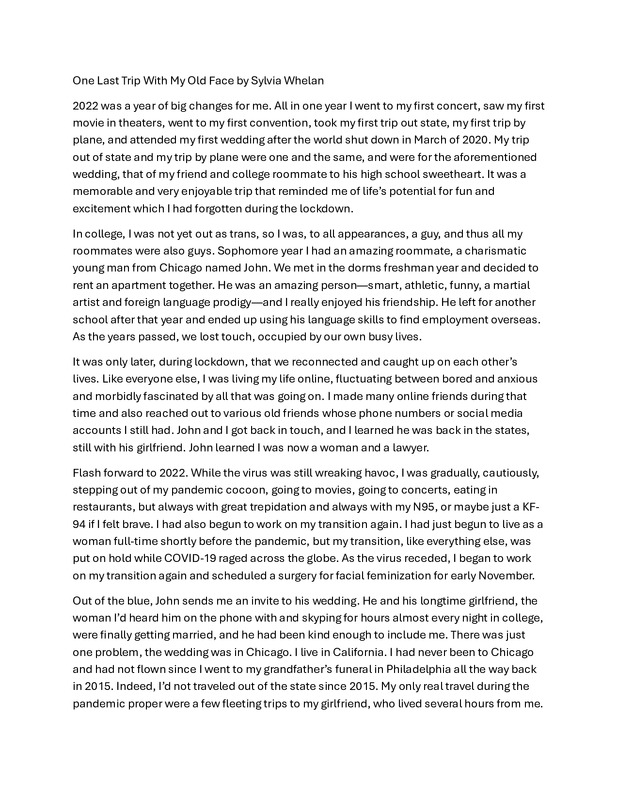 2022-10-16
2022-10-16One Last Trip With My Old Face
This is a story about my first trip out of state after the pandemic began. During lockdown, I reconnected with an old friend and was later invited to his wedding. It was my first time going to Chicago and I had a wonderful time. -
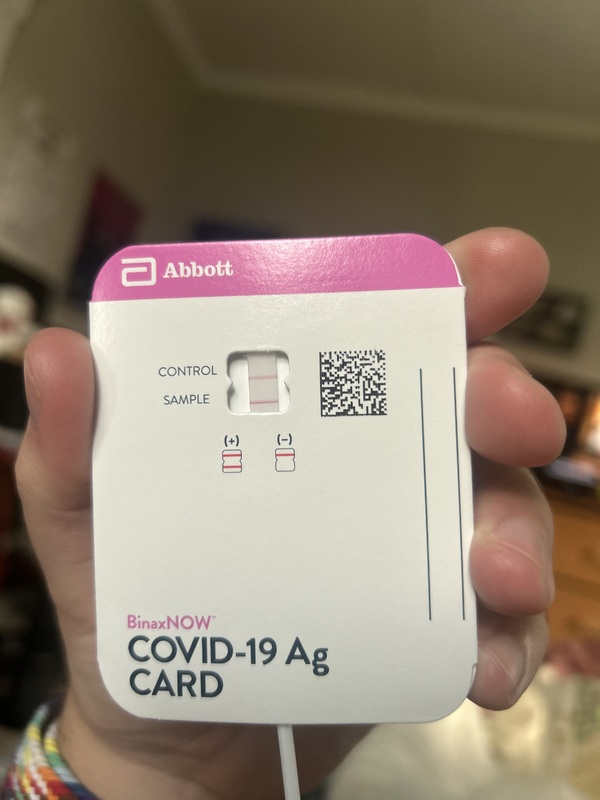 2023-06-20
2023-06-20Finally got COVID
I finally got sick with COVID after 3 years. I went on a cruise to celebrate my fiancé’s graduation and had to remove my mask when the heat was so bad in Mexico, Belize, and Honduras. I’m mostly worried about getting my fiancé sick who is disabled, but hopefully we don’t live together just yet. I’m currently being isolated in my parents house watching people stream on Twitch.TV and playing Animal Crossing. I had a fever of 101 yesterday, and hopefully am able to return to work on Friday which means I’ll be able to represent my work at Hampton Roads Pride on Saturday. Since it’s pride month, me getting COVID feels very homophobic -
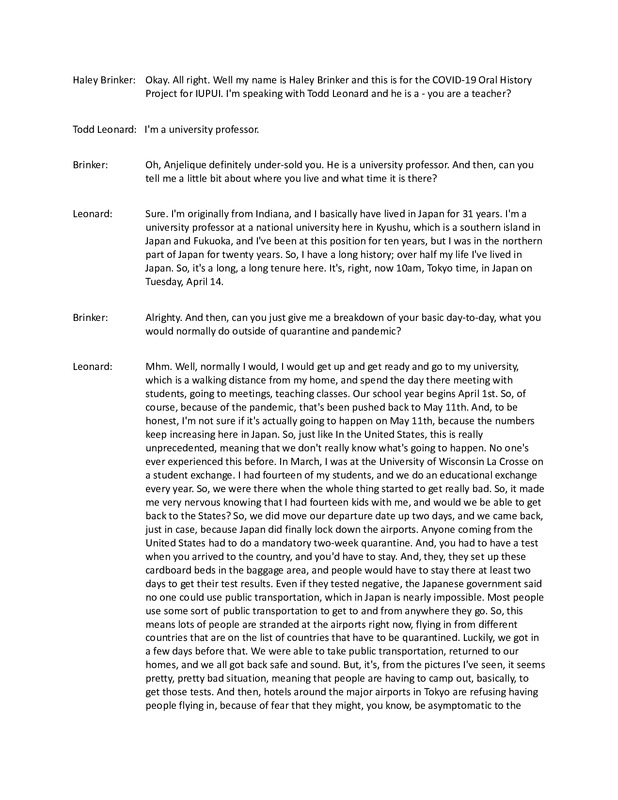 04/14/2020
04/14/2020Todd Leonard Oral History, 2020/04/14
-
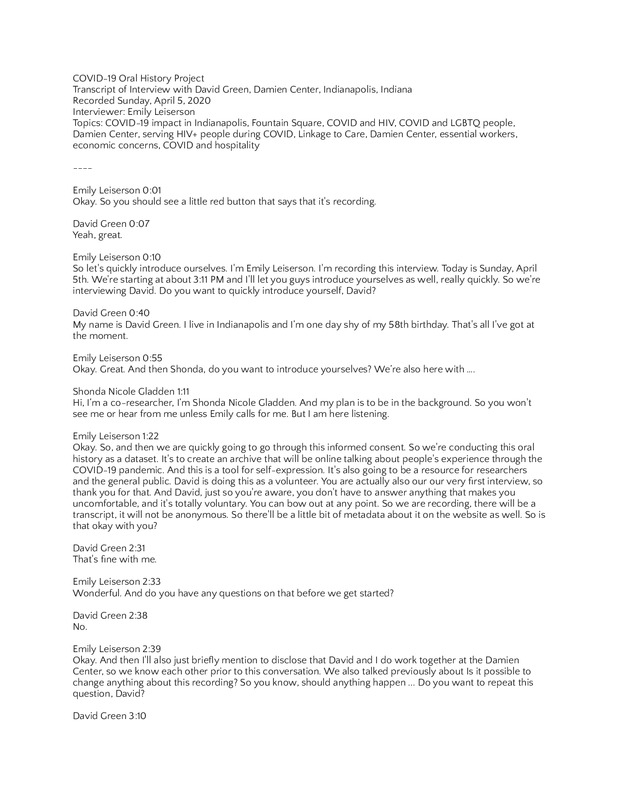 04/05/2020
04/05/2020David Green Oral History, 2020/04/05
-
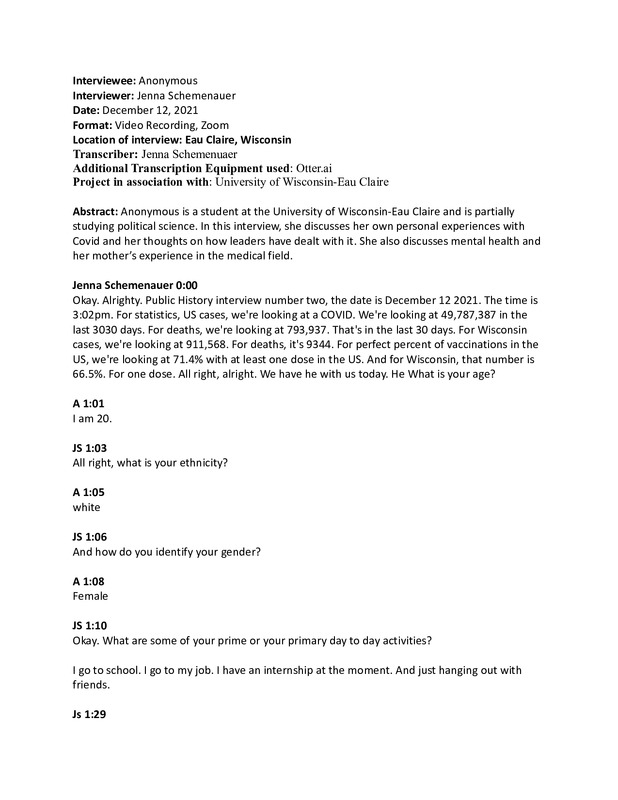 12/12/2021
12/12/2021Anonymous Oral History, 2021/12/12
Anonymous is a student at the University of Wisconsin-Eau Claire and is partially studying political science. In this interview, she discusses her own personal experiences with Covid and her thoughts on how leaders have dealt with it. She also discusses mental health and her mother’s experience in the medical field. -
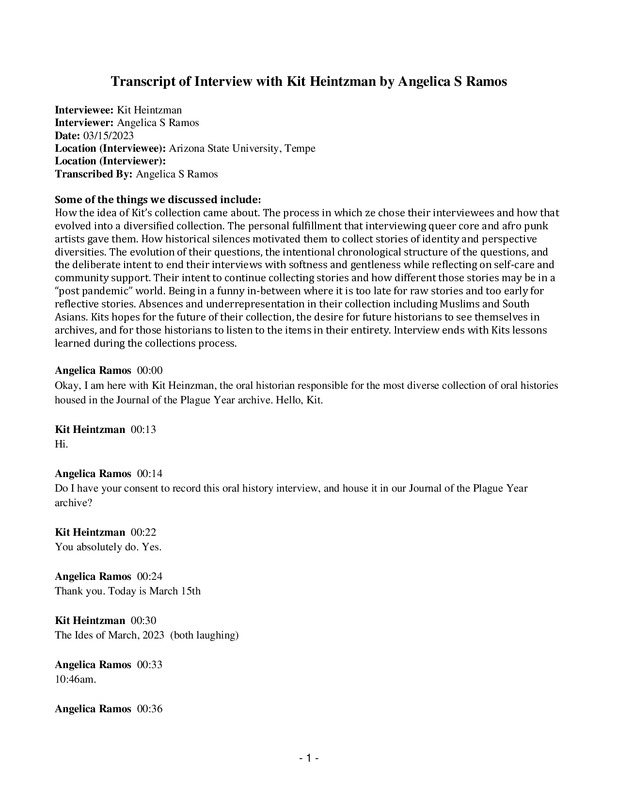 2023-03-15
2023-03-15Kit Heintzman Oral History, 2023/03/15
Kit Heintzman is a recovering academic currently residing in Lenapehoking, who was trained in the medical humanities with a special interest in queer theory, animals, and the history of nationalism. Kit has developed a singular collection of oral histories of the pandemic for A Journal of the Plague Year, collected from a range of individuals with widely diverse experiences. That collection addresses significant silences surrounding the pandemic broadly and within JOTPY more narrowly. In this item Kit is interviewed by Angelica and Erin, both with Arizona State University, about Kits collection process. -
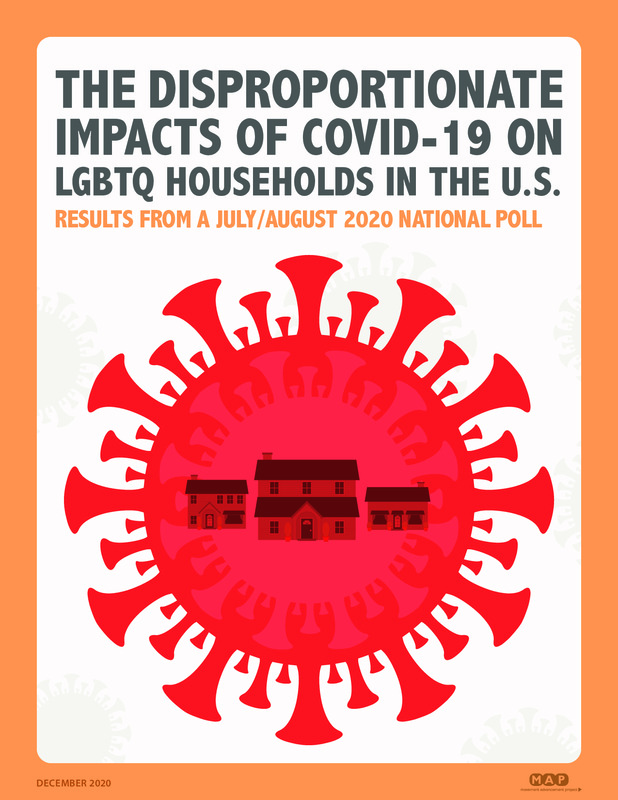 2020-12
2020-12The impact of COVID on the LGBTQ+ Community
This PDF details data related to the LGBTQ+ Community's relationship with COVID in America. Based on the data, it is clear many within the community struggled with excessive financial issues, the inability to receive medical care, and the loss of insurance. While the pandemic has placed serious burdens as a whole on society, data such as this is valuable as it allows a look into the most vulnerable communities within society already, and how COVID has destroyed the once normal lives of so many. -
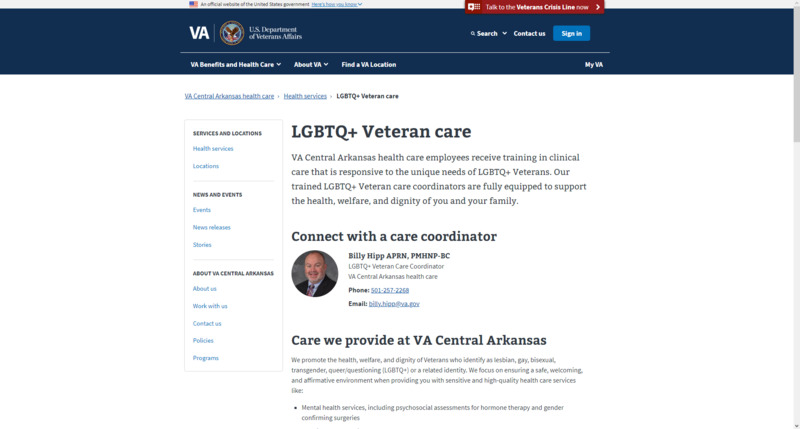 2022-07-11
2022-07-11LGBTQ+ VA Healthcare in Arkansas in the wake of COVID
This is the Arkansas Veterans Affairs website listing specific resources for LGBTQ+ veterans in Arkansas. This site places a specific emphasis on Central Arkansas due to the heavy LGBTQ+ population in that area. In order to combat COVID-19, this site focuses on not only concerted vaccine rollout for LGBTQ+ vets, but also lists mental health resources in order to combat COVID-19. I think this shows a particular vulnerability to a select group and how COVID-19 can reach anyone. Indeed, it is essential that at-risk groups such as the LGBTQ+ community are not overlooked in the age of COVID, and it is encouraging to see the VA take steps to assure this is the case. -
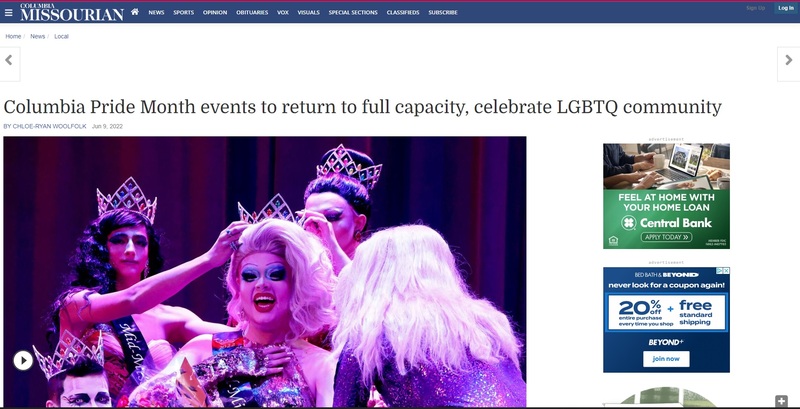 2022-06-09
2022-06-09Columbia Pride Month events to return to full capacity, celebrate LGBTQ community
This is a news story from Columbia Missourian by Chloe-Ryan Woolfolk. After two years of either cancellations or limited capacities, Pride Month events in Columbia will be returning to full capacity. Listed in the article are local events that people can attend now, with lists of fees and general details. -
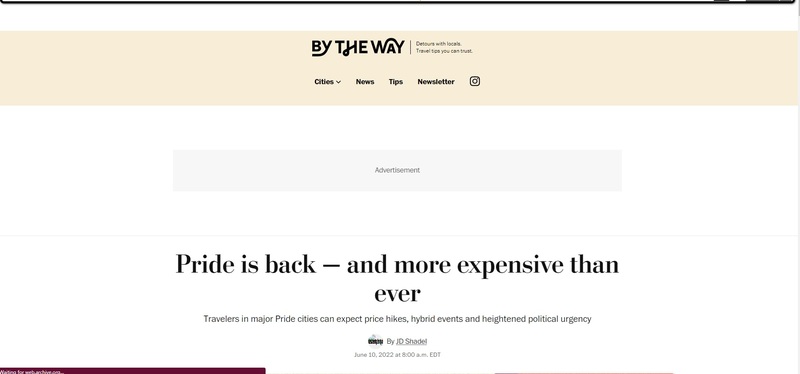 2022-06-10
2022-06-10Pride is back — and more expensive than ever
This is a news story from The Washington Post by JD Shadel. Due to the last two years of Pride Month remaining virtual due to COVID, some changes have been made along with it. Included in the changes since COVID are leadership ones in Philadelphia and London after allegations of their Pride leadership having racism and transphobia. The rising inflation has made it so summer travel is more expensive than before. Things like hotels, plane rides, and other modes of transportation cost more than they did before COVID. One change that has been brought about because of COVID is the rise of virtual events. Groups like NYC Pride, Capital Pride and Pride Amsterdam will have online streaming available. The NYC Pride March and the LA Pride March will be available on Hulu. Another debate that has changed since COVID are questions about "pinkwashing" in which a company will recognize Pride for profit, while not donating to any LGBTQ organizations. Some of the corporations in the past that have used Pride merchandise to sell things during Pride month while contributing to anti-LGBTQ organizations have been heavily criticized recently. Overall, COVID has contributed to changes in how Pride is celebrated. -
 2022-06-04
2022-06-04After coming out during the pandemic, many LGBTQ+ folks look to 2022’s Pride with a mix of emotions
This is a news story from The Seattle Times by Scott Greenstone. Pride has changed quite a bit over the last two years due to COVID. For a while, Pride celebrations were held virtually. The in-person events in 2022 will now resemble what Pride was like prior to the virus. Included in this article are personal stories of people who did not come out until the pandemic, with this year being the first year they will attend Pride in-person. For some, they didn't realize they were trans until the pandemic hit. Rhys Hutton, for instance, did not know he was trans, and is also coming to grips with having autism. Hutton's story of how he came to the realization started on TikTok when the algorithm kept showing videos of trans-masculine people. This exposure helped him figure out his identity more. Stories like this are not uncommon, according to a recent Gallup poll, ten percent of Millennials and twenty percent of Gen Z identify as LGBTQ+. -
 2022-05-19
2022-05-19Everything You Need to Know About DC Black Pride 2022
This is a news story from Metro Weekly by Joseph Reberkenny. For the first time since COVID started, DC Black Pride will be back in-person. It is organized by the Center for Black Equity and it includes over 25 events highlighting the Black LGBTQ community in Washington. During the height of the COVID outbreak, the Center for Black Equity held events online instead. The organizers say that in-person events are special for this community and has planned safety precautions for people attending. There will be things like masks available at the event in addition to rapid test kits. -
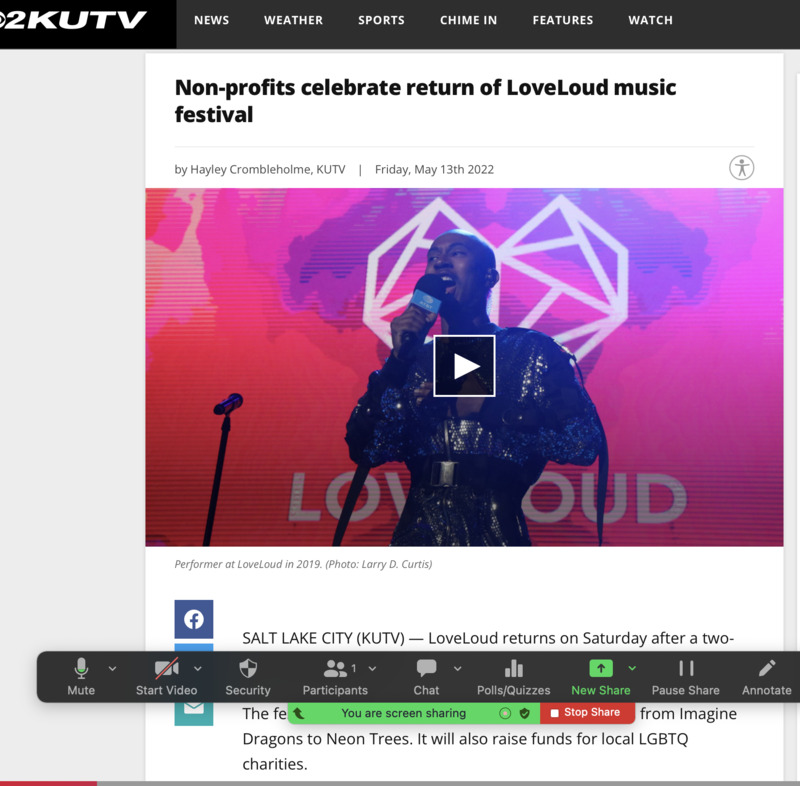 2022-05-13
2022-05-13Non-profits celebrate return of LoveLoud music festival
This is a news story from KUTV by Hayley Crombleholme. After a two year break, LoveLoud will return, and will feature acts like Neon Tress and Imagine Dragons. This event is to help raise funds for LGBTQ charities. COVID has been hard on non-profit organizations. While this festival is meant to raise money for LGBTQ youth, some are excited to be back for in-person events. -
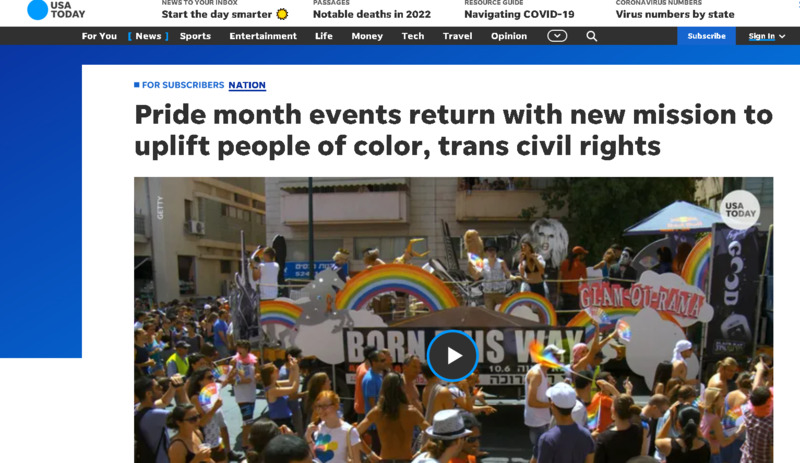 2022-04-19
2022-04-19Pride month events return with new mission to uplift people of color, trans civil rights
This is a news story from USA Today by Bill Keveney. Pride parades will be returning to full-scale since 2019. With the events that happened during COVID, some changes have been made in how it is celebrated. For 2022, more people of color and trans people have been added to leadership positions. Participation is also going to be more accessible for disabled and low-income as well, by making some events online for easier access. Police brutality will also be addressed due to the Black Lives Matter protests of 2020. Seattle Pride has banned police from Pride. Along with this, there is also the theme of speaking out against the anti-LGBTQ legislation that is happening across the United States. -
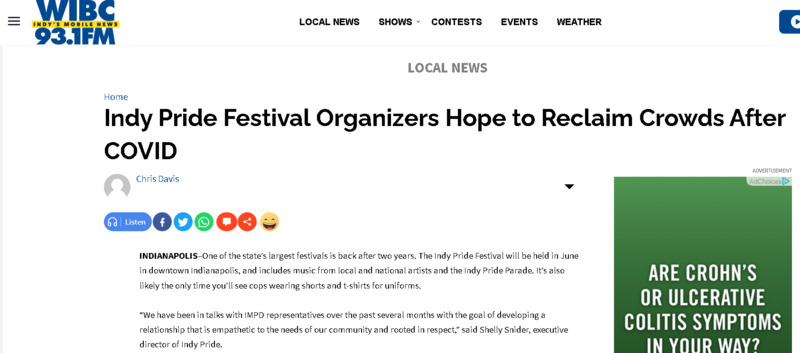 2022-05-13
2022-05-13INDY PRIDE FESTIVAL ORGANIZERS HOPE TO RECLAIM CROWDS AFTER COVID
This is a news story from WIBC by Chris Davis. According to the article, the Indy Pride Festival will be back after a two year hiatus due to COVID. The event will be held Indianapolis. Since the hiatus, some changes have been made. Cops at Pride will be in softer uniforms to make them more approachable. This will include shorts instead of the standard pants. There will also be police on bicycle patrol during the event. Shelly Snider, an executive director of the parade, says that the goal is to help queer people feel safe from major incident, but understands the rough relationship queer people in the past have had with the police force in general. -
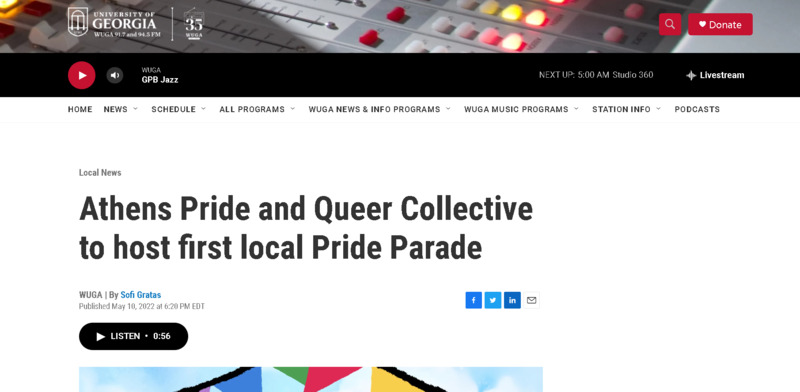 2022-05-10
2022-05-10Athens Pride and Queer Collective to host first local Pride Parade
This is a news story from WUGA by Sofi Grates. According to this article, it says that Pride Month will be back in full swing in Athens after it being canceled due to COVID. It will be hosted by Athens Pride and Queer Collective. The parade that is sent for June 12 will include vendors, music, and a cookout -
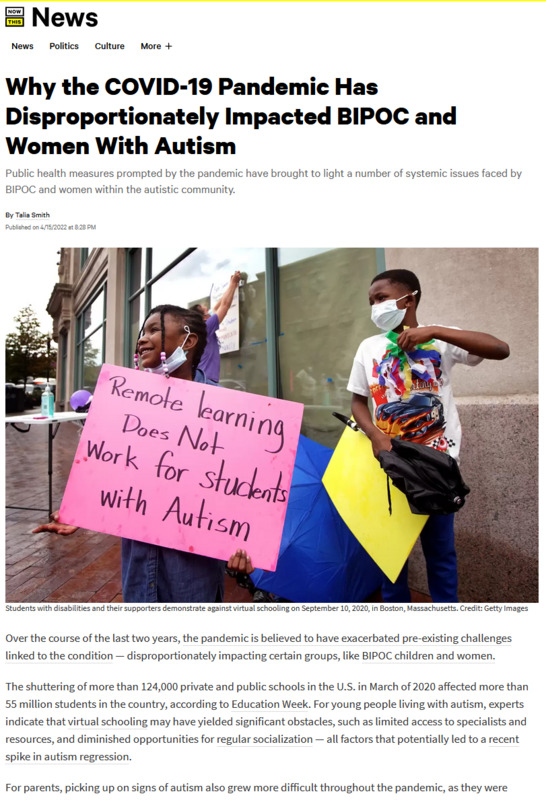 2022-04-15
2022-04-15Why the COVID-19 Pandemic Has Disproportionately Impacted BIPOC and Women With Autism
This is a news story from Now This News by Talia Smith. The author says that over the course of the pandemic, BIPOC and autistic women have been disproportionately affected. BIPOC parents who were not able to work remotely struggled to support their autistic children. One study led by the NIH analyzing the impact of the pandemic on BIPOC and low-income populations shows that families with a child living with autism witnessed an increase in sleep issues and behavioral problems, in addition to increased conflict between children and adults and the use of more severe disciplinary methods. In a study published in “Molecular Autism,” researchers revealed that for adults with autism, the pandemic brought relief from certain stressors like “sensory overload” and ultimately led to an “increase in solidarity.” -
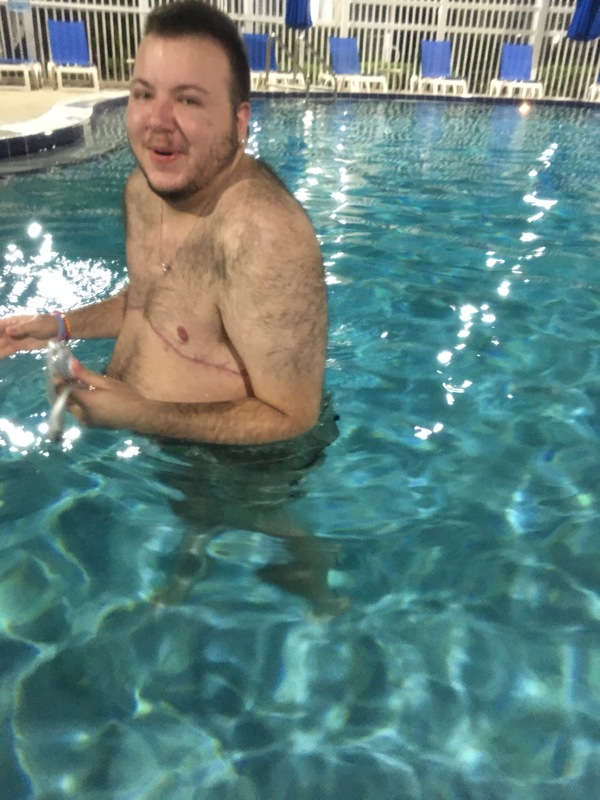 2020-12-28
2020-12-28First Time Swimming Shirtless During The Pandemic
This is a picture of me swimming for the first time after top surgery! I can't even begin to explain how free I felt. One of the things I was worried about was the fact that my fiancé and I not being able to swim because there was people there, but it was completely empty! It was almost like it was meant to be. After being confined about something for so long and being able to take off my shirt in public was so weird! Before this picture, the last time I went swimming was in 2015. And now, I'm able to enjoy the water and the beach with my fiancé. -
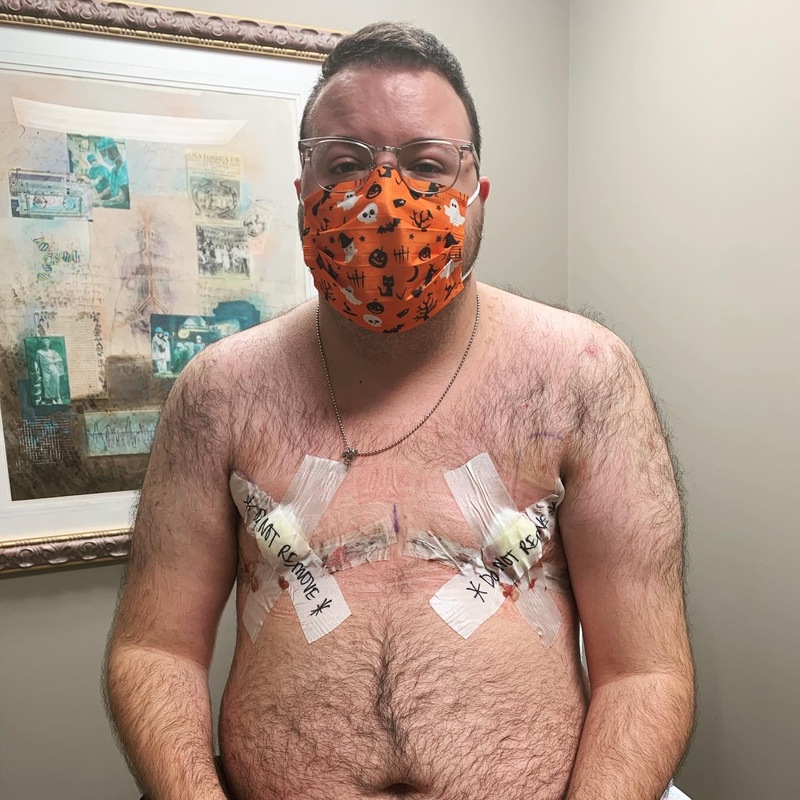 2020-10-09
2020-10-09Traveling During The Pandemic For Top Surgery
I traveled from Virginia to Texas for my top surgery. We drove all the way there and stopped in Tennessee on the way there and on the way back. I hadn't gotten the vaccine yet for COVID-19 and I was going to be going to a hospital in a different state that I had never been to. This is was the crazy decision I had ever made, but it was so worth it. -
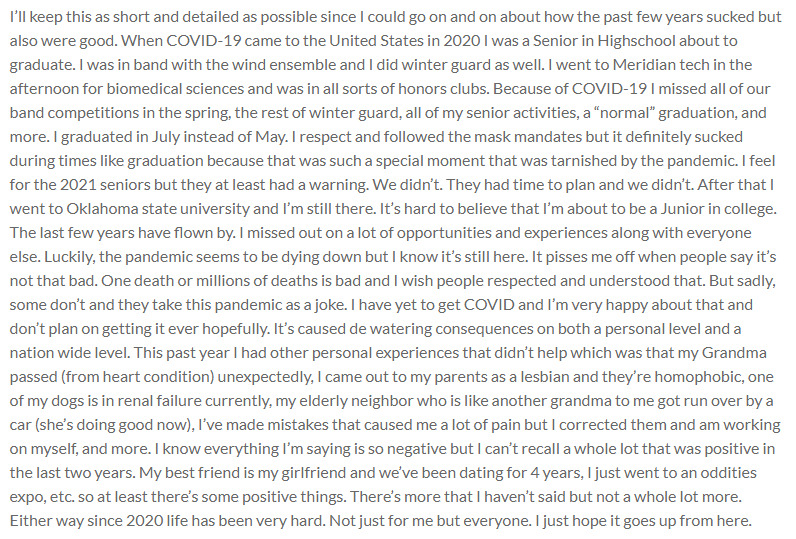 2022-04-18
2022-04-18COVID-19 and my life.
I’ll keep this as short and detailed as possible since I could go on and on about how the past few years sucked but also were good. When COVID-19 came to the United States in 2020 I was a Senior in Highschool about to graduate. I was in band with the wind ensemble and I did winter guard as well. I went to Meridian tech in the afternoon for biomedical sciences and was in all sorts of honors clubs. Because of COVID-19 I missed all of our band competitions in the spring, the rest of winter guard, all of my senior activities, a “normal” graduation, and more. I graduated in July instead of May. I respect and followed the mask mandates but it definitely sucked during times like graduation because that was such a special moment that was tarnished by the pandemic. I feel for the 2021 seniors but they at least had a warning. We didn’t. They had time to plan and we didn’t. After that I went to Oklahoma state university and I’m still there. It’s hard to believe that I’m about to be a Junior in college. The last few years have flown by. I missed out on a lot of opportunities and experiences along with everyone else. Luckily, the pandemic seems to be dying down but I know it’s still here. It pisses me off when people say it’s not that bad. One death or millions of deaths is bad and I wish people respected and understood that. But sadly, some don’t and they take this pandemic as a joke. I have yet to get COVID and I’m very happy about that and don’t plan on getting it ever hopefully. It’s caused de watering consequences on both a personal level and a nation wide level. This past year I had other personal experiences that didn’t help which was that my Grandma passed (from heart condition) unexpectedly, I came out to my parents as a lesbian and they’re homophobic, one of my dogs is in renal failure currently, my elderly neighbor who is like another grandma to me got run over by a car (she’s doing good now), I’ve made mistakes that caused me a lot of pain but I corrected them and am working on myself, and more. I know everything I’m saying is so negative but I can’t recall a whole lot that was positive in the last two years. My best friend is my girlfriend and we’ve been dating for 4 years, I just went to an oddities expo, etc. so at least there’s some positive things. There’s more that I haven’t said but not a whole lot more. Either way since 2020 life has been very hard. Not just for me but everyone. I just hope it goes up from here. -
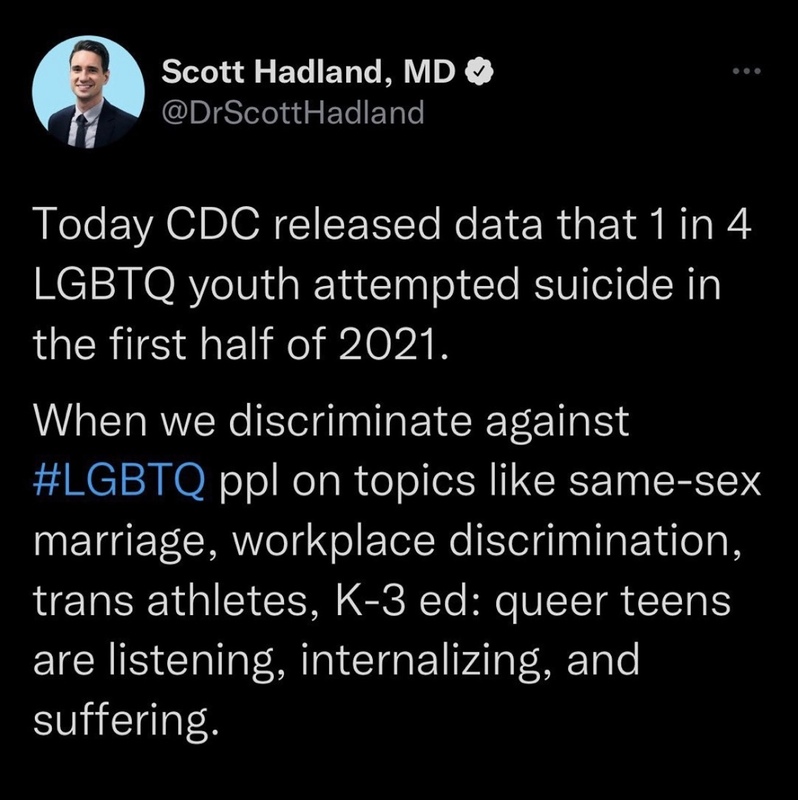 2022-03-31
2022-03-31Suicide Statistics Against Queer Youth
Suicide statistics against queer youth released by the CDC in the first half of 2021. According to the CDC, 1 in 4 queer children attempted suicide. -
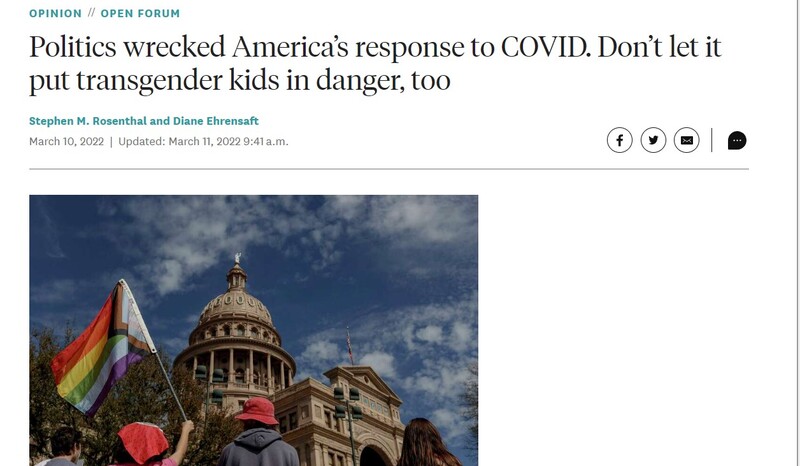 2022-03-10
2022-03-10Politics wrecked America’s response to COVID. Don’t let it put transgender kids in danger, too
This is a news story from The San Francisco Chronicle, written by Stephen M. Rosenthal and Diane Ehrensaft. This is an opinion piece comparing the government response to COVID and the politics surrounding it to ruining the response. The authors warn that following politics over science is dangerous. It later goes on to talk about the anti-trans legislation being passed through different states, such as: Idaho, Texas, and Florida. The authors believe that science proves that trans kids have no real threat from puberty blockers. A study is also quoted, where it says that gender affirming care for trans youth is linked to lower instances of depression. The point of this article is not so much about COVID itself, but fear of what was done during the peak of COVID being repeated on other types of legislation, and in this case, using politics over science with trans kids. -
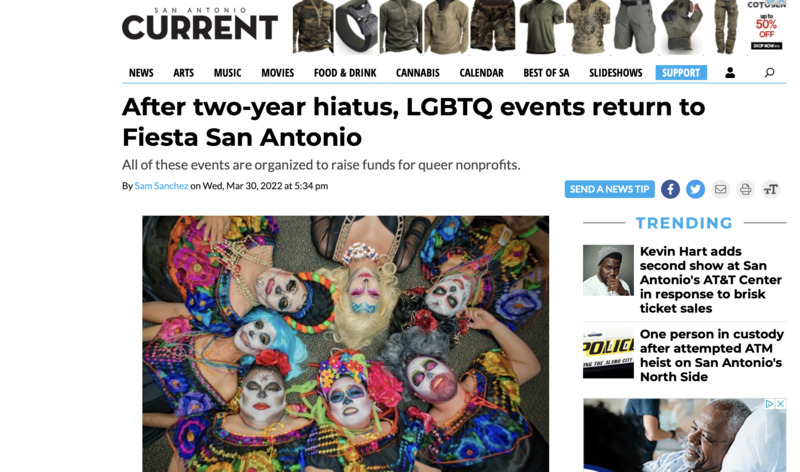 2022-03-30
2022-03-30After two-year hiatus, LGBTQ events return to Fiesta San Antonio
This is a news story from the San Antonio Current by Sam Sanchez. This story is about LGBTQ events returning to San Antonio after a two year break due to COVID. For the past two years, many of these events have been canceled. This article shares events happening in San Antonio and what non-profits they benefit. Some of these non-profits include: the San Antonio AIDS Foundation, The Thrive Youth Center, Pride San Antonio and BEAT AIDS. Events include: themed parties, chili cook-offs, party shuttles, and fiestas. Certain events include fees for attending and certain COVID precautions, such as masks, to attend. -
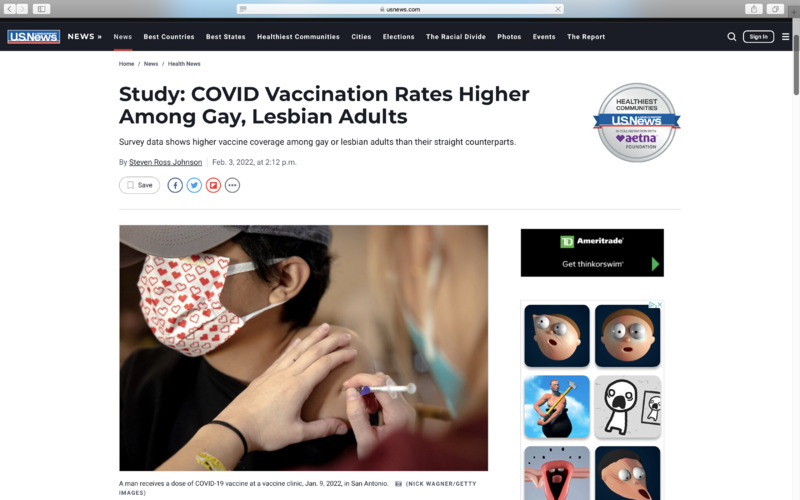 2022-02-03
2022-02-03Study: COVID Vaccination Rates Higher Among Gay, Lesbian Adults
This is a news story for US News by Steven Ross Johnson. This story is about a study on how LGBTQ+ people are more likely to have been vaccinated compared to the general population. In a survey published by the CDC, 85% of gay and lesbian adults received at least one dose of the COVID vaccine compared to just 76% of heterosexual adults. Within the LGBTQ+ community, gay men had the highest vaccination rates at 89%, compared to 81% of women. Nearly 76% of trans and nonbinary adults report having had at least one dose. This study also noted income disparities among LGBTQ+ adults. Those with a $75K income or above and LGBTQ+ had a 94% vaccination rate. For those LGBTQ+ adults below poverty level, the vaccination rate was 74%. Along racial lines, White LGBTQ+ individuals had a 92% vaccination rate. Black LGBTQ+ adults reported vaccination rates of 67%. Overall, this article shows that LGBTQ+ individuals are more likely to have less vaccine hesitancy compared to the general population, though income and race make a difference when those elements are combined. -
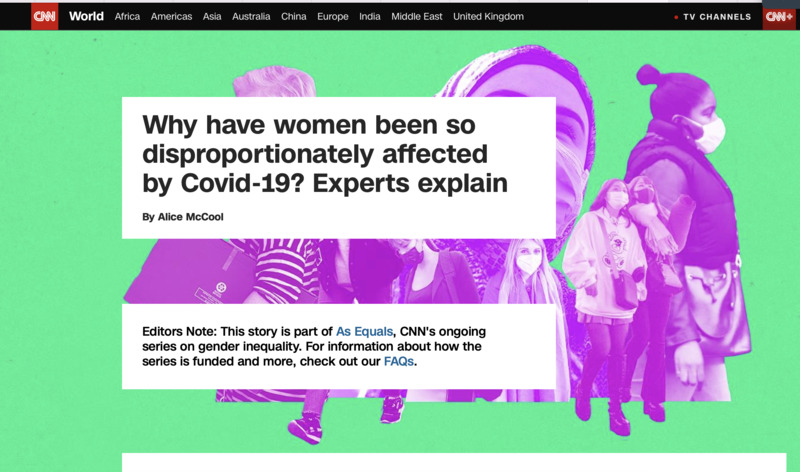 2022-03-10
2022-03-10Why have women been so disproportionately affected by Covid-19? Experts explain
This is a news story from CNN by Alice McCool. This story talks about the inequalities women have faced during COVID-19. In a CNN poll, women in the G7 countries (US, UK, France, Germany, Canada, Japan, and Italy) felt less supported by their leaders than men did. Some of these inequalities include women being more likely to lose their jobs or take on more uncompensated care work. Other things, such as abortion services, were considered non-essential in some countries during COVID. Minority women and poor women were also more likely to work low-paying jobs and bear much of the economic strain. Additionally, trans healthcare was also viewed as non-essential in many places. In places like Uganda, many women lost their safety net provided from schools, resulting in rising teen pregnancies and early marriages. This article continues showing more examples of the hoops women had to jump through compared to men and demonstrates the social issues that got worse as a result from COVID lockdowns. -
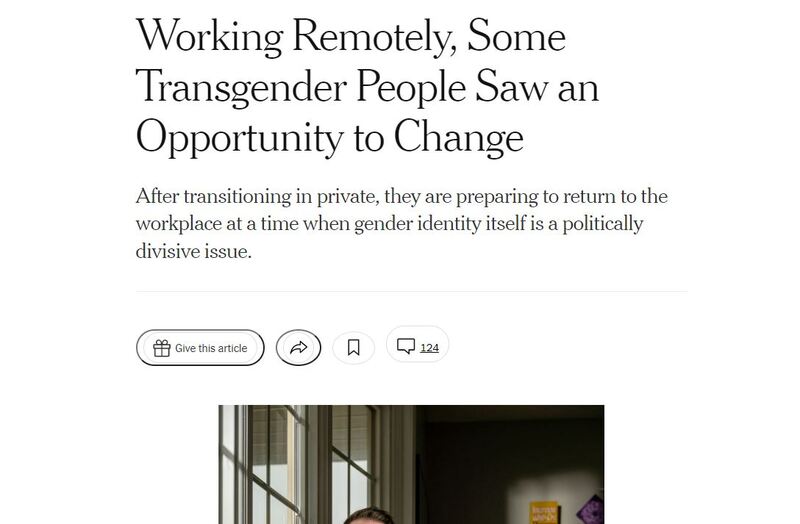 2022-03-17
2022-03-17Working Remotely, Some Transgender People Saw an Opportunity to Change
This is a news story from the New York Times by Jenny Gross and Alyssa Lukpat. This story is about people that have transitioned during COVID, or before that, and their work experiences. Some of the data present is interesting to look at. In 2021, healthcare providers reported a stronger demand for confirmation surgeries compared to 2020 when many elective surgeries were postponed. Though, demand was even higher in 2021 compared to 2019, before the pandemic. Some doctors say that this influx is partly due to surgeries being postponed, but there are other explanations. At Mount Sinai Hospital in New York City, the Center for Transgender medicine and surgery performed a total of 938 surgeries in 2021, 60 percent more than the previous year, and 43 percent higher than 2019. While there is this influx, the story links to a YouGov poll showing that many Americans are still divided on if others should be legally allowed to switch their sex. The article then goes on to discuss other inequalities trans people face, such as earning 32 percent less than the general population. Trans people are also twice as likely to be unemployed compared to the general population. Later on, there is a discussion on what trans people face in the workforce. Even in more liberal and progressive work environments, some trans people still report feeling unsafe working in person. There are complaints that diversity training in the workplace focuses mainly on gays, but glosses over trans people and their issues. Other trans people, like Rae Lee, fears she will be fired if she came out to public administrators. Working from home has allowed Rae Lee to feel safer. -
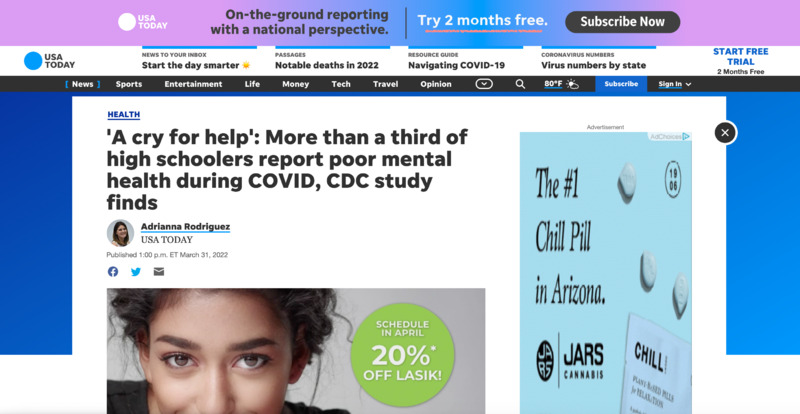 2022-03-31
2022-03-31'A Cry for Help': More than a Third of High Schoolers Report Poor Mental Health During COVID, CDC Study Finds
This is a story from USA Today by Adrianna Rodriguez. This is about the mental health in teens during the pandemic and how it has affected them. The CDC study that is cited says that 44% of high schoolers reported feeling persistently sad or helpless during 2021. Over half of the students surveyed were reported to have experienced emotional abuse from a parent, with 11% saying they have experienced physical abuse. Nearly 30% of students reported a parent or another adult in their house had lost a job. In a demographics breakdown, LGBT students reported more suicide attempts and poorer mental health than their counterparts. One third of students say that they have experienced racism. This article is meant to help show the impact COVID has had on people and the way lockdowns have impacted high schoolers specifically. -
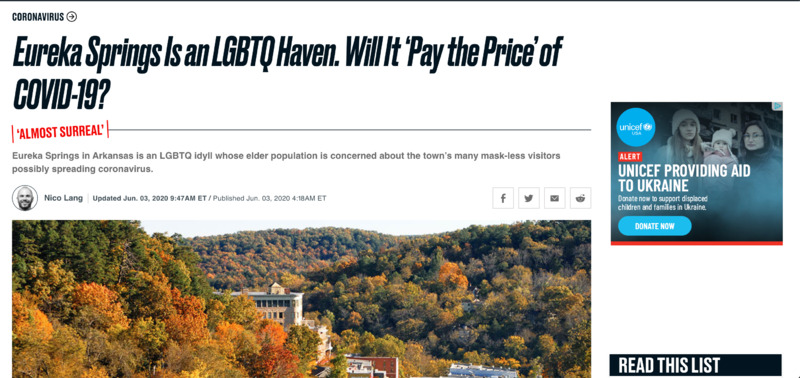 2020-06-03
2020-06-03The Survival of an LGBTQ+ Community in the Bible Belt During the Age of Covid-19
Deep in the Ozark Mountains lies the small resort town of Eureka Springs, Arkansas. This community relies heavily on tourism, shopping, and the many natural spas erupting from within the Ozarks. This community is also home to a thriving LGBTQ+ community in the heart of the Conservative Bible Belt. As Covid quickly enveloped Arkansas and restrictions were placed on activity, Eureka Springs and the LGBTQ+ crowd suffered. While there is a strong Queer population in Eureka Springs, the area is home to a strong evangelical crowd. This article details how the LGBTQ+ community took greeter precautions to protect against Covid, while the Evangelical crowd largely disregarded the pandemic entirely. Covid truly resurfaced a tremendous divide amongst the population of Eureka Springs which had, for the most part, been stable. The nature of pandemic regulations and the adherence or neglect of these regulations spilled over into the greater conflict between Evangelicals and the LGBTQ+ community, an occurrence that would otherwise be non-existent without the presence of Covid-19. This article highlights that while Covid seems to have the primary grip over our lives at the moment, we must be conscious of the impact Covid can have on other areas of life, deep-seeded conflict, and the general safety of vulnerable groups. -
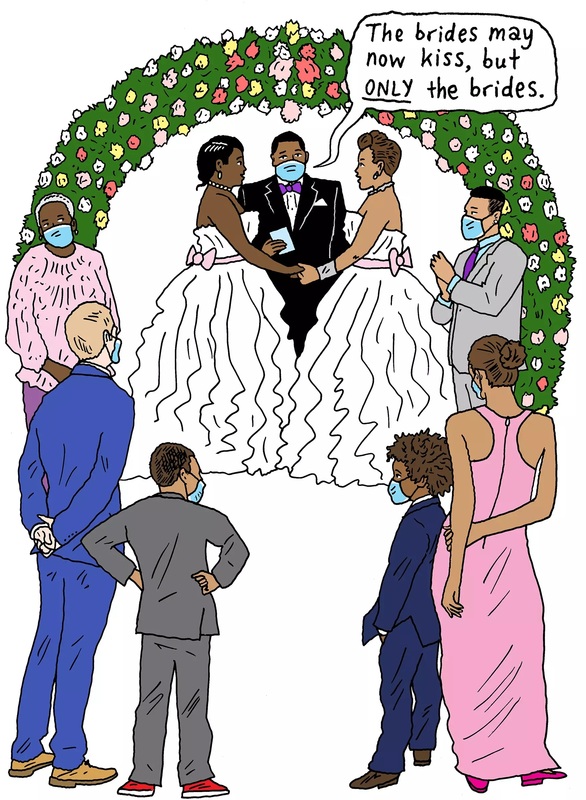 2022-03-27
2022-03-27Were masks and pandemic anxiety a useful distraction towards ideas that should not matter, but did (to many)?
Like everything having to do with public interactions during the COVID-19 pandemic, social distancing and lockdowns significantly impacted "traditional weddings." Gone were the days of large weddings, dancing around mask free and hugging the happy couple. If you search the internet, you will find a large amount of information on happy couples who had to cancel or alter their plans. Many of the #COVID BRIDES stories on this archive illustrate the extreme panic of changing plans and constant change, such as wearing masks in their pictures. The pandemic altering, delaying, or even preventing weddings has impacted society's mental health and perhaps future cultural traditions in weddings. This archive has a collection on mental health, https://covid-19archive.org/s/archive/page/mental-health, which demonstrates how hard this pandemic has been on many people. The effects on mental health shows how weddings are a popular and important tradition in American society. The ceremony is a way to share your love before others, blend families and friends, and move from a "single person" to a team. When I say wedding, I mean the customs and celebration within the ceremony, not the genders of the couple. Gay marriage has not been legal throughout America long, only since 2013. The anxiety and stress of two years of delayed/cancelled weddings during a pandemic pale in comparison to the longstanding social pressure for LGBTQ people not to marry, on top of previous legality issues. There is still a large group of Americans that have the opinion that it is "evil" or a sin. I have seen and heard in person, movies, or television disparaging remarks on the idea of two men or two women getting married and/or kissing. I wanted to highlight this picture from TIME magazine as I hope it demonstrates that masks made people freak out. The idea that the officiant and the people were so distracted and concerned about the two brides either not wearing masks or being the only two kissing while not wearing masks----rather than not being male/female made me smile. I hope some of the pain, anxiety, and discomfort of the pandemic was turned into positivity by distracting people from the meaningless idea of couple's gender and that some LGBTQ opponents realized there are bigger problems in the world. -
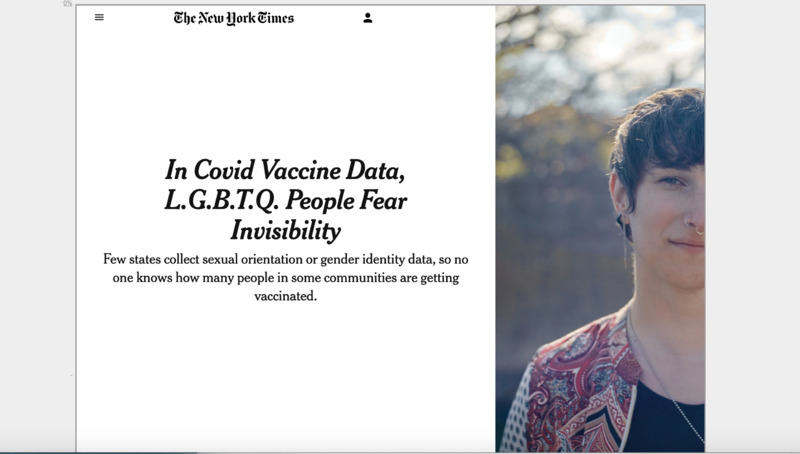 2021-05-07
2021-05-07The Invisibility of the LGBTQ+ Community in the age of COVID-19
This is an article form the New York Times detailing the views of a transgender woman and her views on the invisibility of Queer people when collecting data regarding vaccines. There has been extensive data highlighting the disparity of President Biden's vaccine rollout along racial and socio-economic lines. Racially diverse and poorer communities have faced some of the greatest struggles when dealing with COVID-19, yet disproportionately have received less vaccines and vaccine availability. While the disparity is recognized, little seems to be done to change it. Further related to the article, the transgender woman in question, Josie Nixon, expressed her fears that Queer people arguably face a greater disparity and fears that the community will become faded in the attempt to quickly roll-out vaccines. Nixon asserts that while there is an abundance of data associated with racial and economically impoverished groups, data related to the LGBTQ+ community is miniscule, which presents a danger of that vulnerable community being left behind. The article's ultimate assertion and conclusion is that Queer people must have greater inclusivity in data collection in order to give a clear picture to the government to aid in the distribution of vaccines. Failing to do so, Nixon argues, places an already at-risk community to greater issues. -
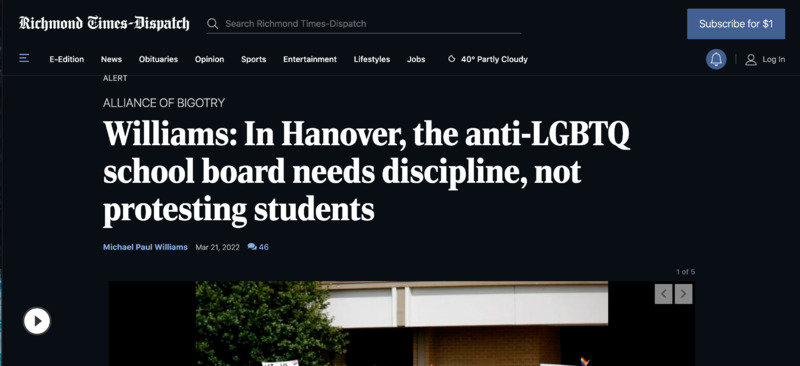 2022-03-21
2022-03-21In Hanover, the anti-LGBTQ school board needs discipline, not protesting students
This story is about the school board of Hanover County in Virginia needing discipline instead of letting it's students protest and participate in walk-outs during school hours because of the policies against their transgender students. The school board is accused of having no intentions of supporting the non-binary and transgender students of Hanover. This is important because it is once again showing discriminatory policies that the school board keeps bringing up against transgender students during the COVID-19 pandemic. -
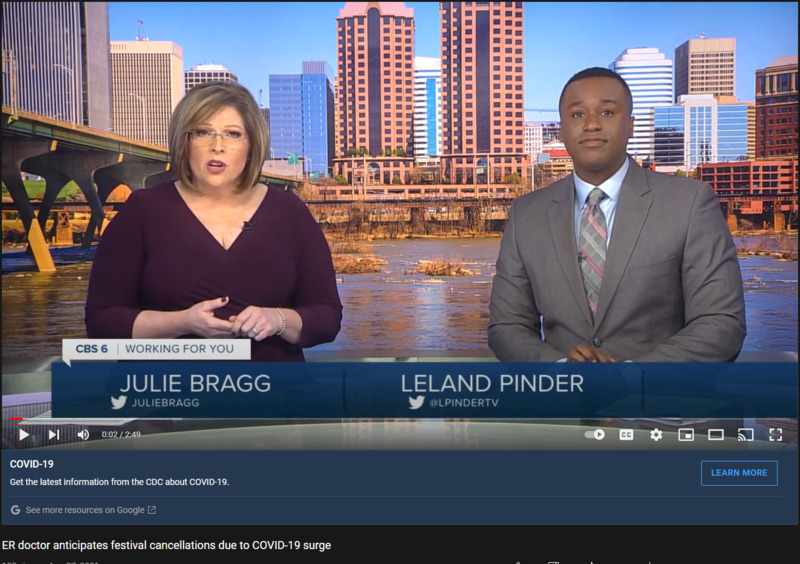 2021-08-21
2021-08-21Virginia PrideFest Postponed due to COVD-19 Surge
Video highlights why the cancelation of PrideFest 2021 was important. During this time in 2021 there was a COVID-19 surge, so for the safety of the community, PrideFest was canceled. This shows the difficulties that the community faced and the hard decisions that had to be made in order to keep the community safe, but also the city of Richmond. -
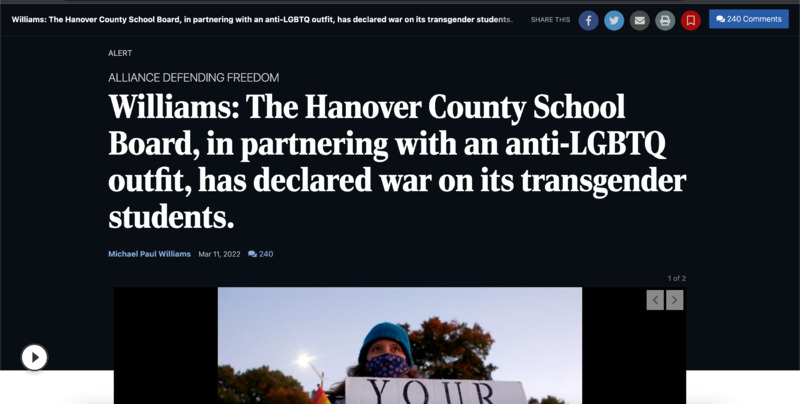 2022-03-11
2022-03-11The Hanover County School Board, in partnering with an anti-LGBTQ outfit, has declared war on its transgender students.
This news article is from the Richmond Times-Dispatch in Richmond, Virginia. The article contains a recent review of the Hanover Country School Board seeking legal advice from a well-known hate group that disguises themselves as "Christian conservative legal group" also known as the Alliance Defending Freedom. Back in December of 2021, the ACLU of Virginia filed against Hanover County for discriminatory policies against transgender students. The pandemic has bought out numerous laws against the safety of LGBTQ students and individuals. This is just a small example of what queer children have been facing since the start of the pandemic. -
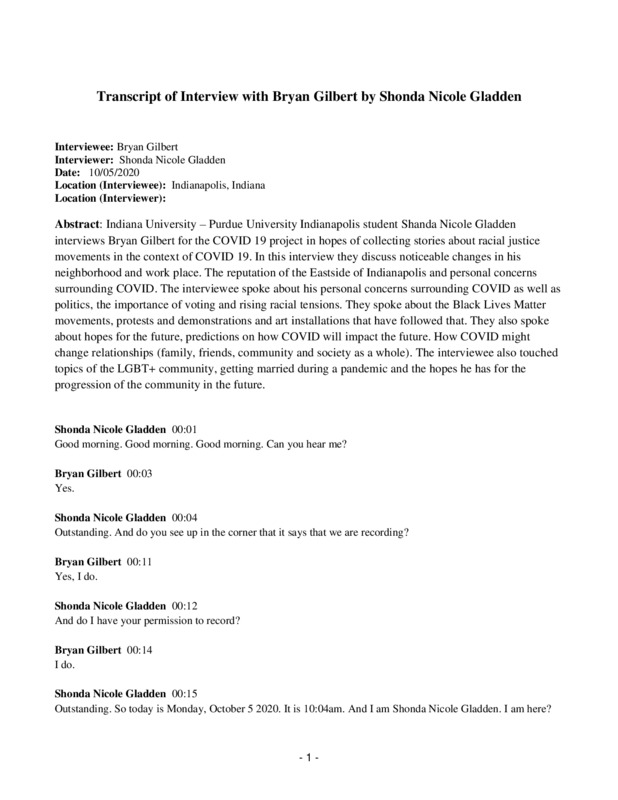 02/22/2021
02/22/2021Bryan Gilbert Oral HIstory, 2020/10/05
HIndiana University – Purdue University Indianapolis student Shanda Nicole Gladden interviews Bryan Gilbert for the COVID 19 project in hopes of collecting stories about racial justice movements in the context of COVID 19. In this interview they discuss noticeable changes in his neighborhood and work place. The reputation of the Eastside of Indianapolis and personal concerns surrounding COVID. The interviewee spoke about his personal concerns surrounding COVID as well as politics, the importance of voting and rising racial tensions. They spoke about the Black Lives Matter movements, protests and demonstrations and art installations that have followed that. They also spoke about hopes for the future, predictions on how COVID will impact the future. How COVID might change relationships (family, friends, community and society as a whole). The interviewee also touched topics of the LGBT+ community, getting married during a pandemic and the hopes he has for the progression of the community in the future. -
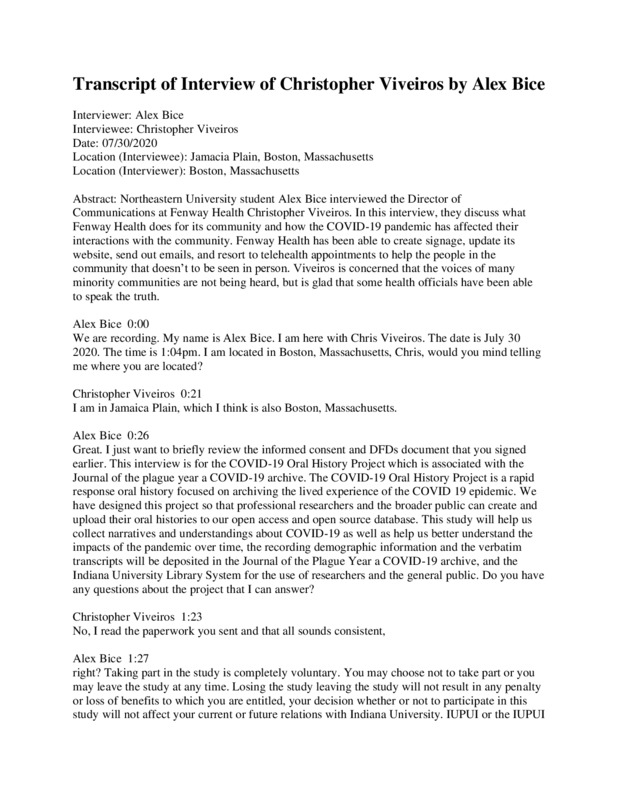 07/30/2020
07/30/2020Christopher Viveiros Oral History, 2020/07/30
Northeastern University student Alex Bice interviewed the Director of Communications at Fenway Health Christopher Viveiros. In this interview, they discuss what Fenway Health does for its community and how the COVID-19 pandemic has affected their interactions with the community. Fenway Health has been able to create signage, update its website, send out emails, and resort to telehealth appointments to help the people in the community that doesn’t to be seen in person. Viveiros is concerned that the voices of many minority communities are not being heard, but is glad that some health officials have been able to speak the truth. -
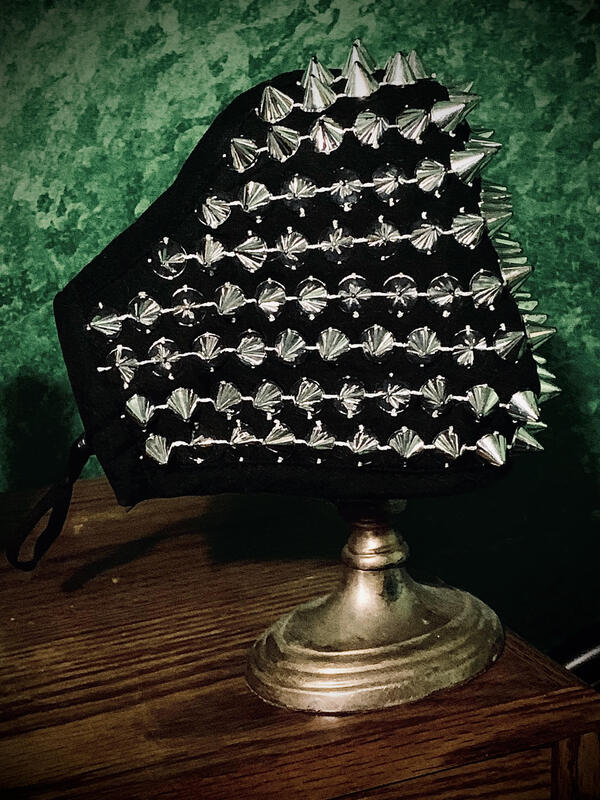 2021-10-03
2021-10-03A Century Later
A look at a global pandemic from a 21st century American point of view, nearly a decade after the last pandemic of the world. -
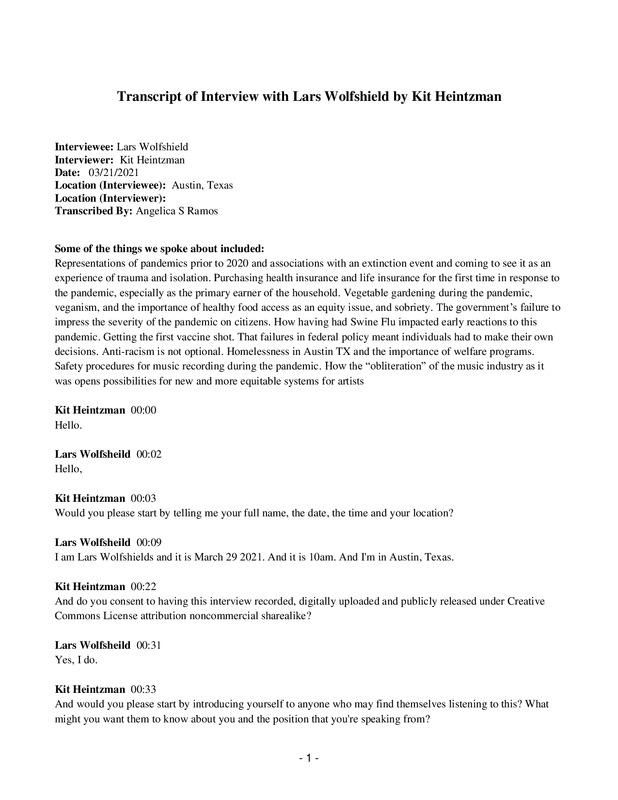 2021-03-29
2021-03-29Lars Wolfshield Oral History, 2021/03/21
Self-Description: “I am a pansexual and gender fluid artist and artist manager and I work primarily with Black and queer musicians and bands.” Record label: https://www.instagram.com/wolfshieldrecords/ -
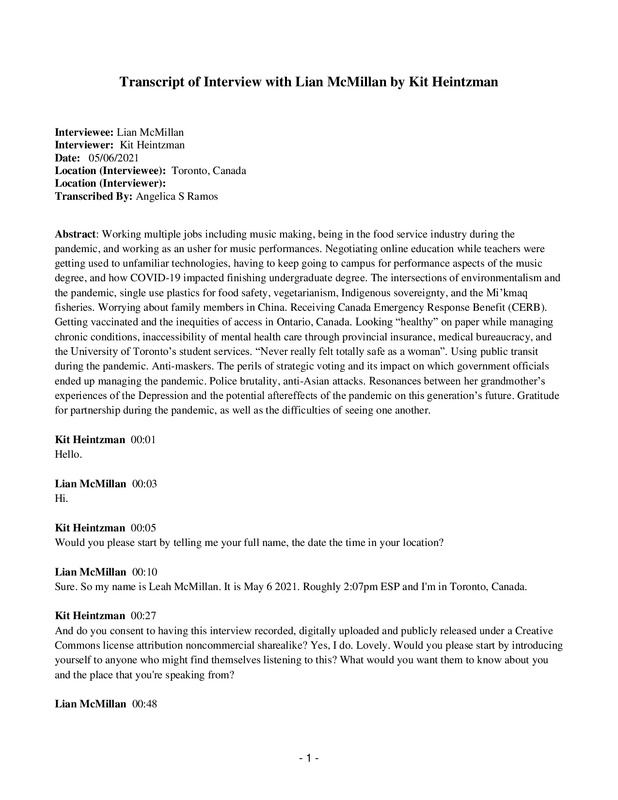 2021-05-06
2021-05-06Lian McMillan Oral History, 2021/05/06
Self Description: “I’m a 21-year-old musician. I just recently graduated from U[niversity] of T[oronto] a week ago, and I graduated with a classical percussion degree. I play for a band called cutsleeve. We’re a group of east Asian, queer sound musicians. I’m a mixed race woman, my father is white, and my mother is Chinese. I’ve lived in Canada, the [United] States, and I lived in Shanghai for a few years. I’m a dog owner.” -
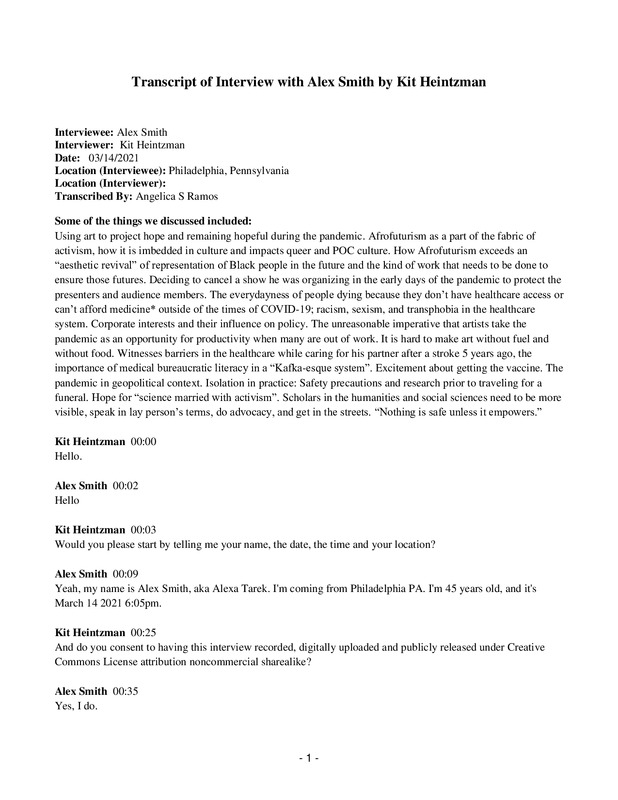 2021-03-14
2021-03-14Alex Smith Oral History, 2021/03/14
Self-description: “I’m an artist, writer, musician, and an off-and-on again activist, lecturer, worshopshop leader. I’m coming out of Philadelphia. My work revolves around concepts relating to Afrofuturism; for lack of a better term: superheroes and the conceptual nature of superheroes and the idea of the vigilante and the people’s champions and heroes can walk among us. I use [aesthetics and the immersive ideas of] from science fiction, cyberpunk, solarpunk, biopunk, and Afrofurturism to empower people of color, queer people and to project us into the future and our ideas and culture into the future as well. I use different mediums to do that, my bands Solarized (a sort of noisy punk rock band) and Rainbow Crimes (indie rock, but a little crazier and noisier than many excursions into that). I have written a short story collection called ARKDUST. And I do collage work and soundscapes and curate events like Laser Life, which was a queer sci-fi reading that me and my friends in a collective that I’m in called Metropolarity put together. That’s my praxis right now: a little bit of everything. I view my work as if I’m creating for 18 or 19 or 20 year old Alex, who probably needed some queer Black sci-fi in his life. So, I’m projecting these aspects of myself back to the past to not just nourish my community, but to nourish myself.” Personal website: alexoteric.com Other biographical details: Vegetarian, experiences depression, Pew Center for the Arts Fellow, during COVID is the first time in his life he’s had Health Insurance. Some of our discussion touched on: Using art to project hope and remaining hopeful during the pandemic. Afrofuturism as a part of the fabric of activism, how it is imbedded in culture and impacts queer and POC culture. How Afrofuturism exceeds an “aesthetic revival” of representation of Black people in the future and the kind of work that needs to be done to ensure those futures. Deciding to cancel a show he was organizing in the early days of the pandemic to protect the presenters and audience members. The everydayness of people dying because they don’t have healthcare access or can’t afford medicine* outside of the times of COVID-19; racism, sexism, and transphobia in the healthcare system.Corporate interests and their influence on policy. The unreasonable imperative that artists take the pandemic as an opportunity for productivity when many are out of work. It is hard to make art without fuel and without food. Witnesses barriers in the healthcare while caring for his partner after a stroke 5 years ago, the importance of medical bureaucratic literacy in a “Kafka-esque system”. Excitement about getting the vaccine. The pandemic in geopolitical context. Isolation in practice: Safety precautions and research prior to traveling for a funeral. Hope for “science married with activism”. Scholars in the humanities and social sciences need to be more visible, speak in lay person’s terms, do advocacy, and get in the streets. “Nothing is safe unless it empowers.” Other cultural references: Netflix, Zombie Movies, Sabrina the Teenage Witch, Oprah’s interview with Meghan Markle and Prince Harry, Black Panther, Teenage Bounty Hunter, Elon Musk, GoFundMe. A specific reference is made to the need for his sister’s sickle cell anemia medicine in this interview. She dies a few months later. The GoFundMe to cover funeral expenses can be found here: https://www.gofundme.com/f/memorial-fund-for-elizabeth-graham?utm_campaign=p_cp_url&utm_medium=os&utm_source=customer -
 2021-03-31
2021-03-31Gyre Oral History, 2021/03/31
Self-Description: “My name is Gyre. I am a multidisciplinary artist based in South Africa with global ambitions. I specialize in music, but I also work as a freelance writer as well as in dance. I’m a dancer learning to choreograph. Political commentator, particularity with regard to the LBGTQA+ community. I identify as queer. I am homoromatic and homosexual at this point in my life. You never know honey, it’s a spectrum. I had my first venture into artistic expression that is rooted in queer rights and queer understanding and queer theory, was my debut album, titled Queernomics, which was a documented audio-visual book about the contemporary experiences of a Black queer South African male, and that has gotten me into the positions that I express myself in, both out of passion and out of profession. Inkosi Yenkonkoni, which means “The Gay King”, in my native language which is Zulu.” Other details available here: Works produced during the pandemic: Kithi, International LGBTQ+ Rights Festival, writing on football. Some of the things we spoke about included: “What happens at the top is just politics, what happens at the bottom is real life.” Thinking about the term “pandemic” Listening to the body The pandemic exposing state corruption Having written a song called “Quarantine” in 2018 The inadequacies and privileges of Medical Aid in South Africa, having aged out of Medical Aid before COVID, the personal impact of worse-health insurance during pandemic, the importance of demonetizing health care Pre-COVID keeping busy: organizing, walking, collaborating Transit during COVID, sub/urban and outskirt disparities Canceling shows and taking dance classes and rethinking what it means to be productive Global Americanization and the impact of Trump’s pandemic denialism on South African health Moving out of disbelief about the severity of COVID after losing a loved one in the first wave Gratitude for the global influence of the Black Lives Matter movement, and sadness that tragedy in the diaspora brings neocolonialism to the fore The importance of social media for queer counter-violence and activist fractures among LGBTQA+ Feeling allyship with the #metoo movement How homophobia intersects with everyday altercations about social distancing The anxieties of hooking up during the pandemic The importance that scientists learn to speak in lay terms about climate change and vaccines Existence as resistance and creating art “Spread love not tolerance” Other cultural references include: Trans Day of Visibility, astrology, and the TV series Pose. -
 2021-03-08T12:38
2021-03-08T12:38Danny Denial Oral History, 2021/03/08
Self-description: “Audio visual artist that lives in Seattle, Washington, specifically in the realm of music and film, and also the intersection of the two. A lot of my work involves amplifying experiences and voices that are often underrepresented, primarily in the Black and LBGTQ+ community. And that’s something that overtime my work has been diving deeper and deeper into over the years, which is something that I think as an artist, I’ve only really come to terms with in the last few years. But it’s been definitely both empowering for me and illuminating to see it reflected back in the ways that people have responded to the work.” Other biographical details: late 20s, from Los Angeles. Some of the things we discussed include: The dysphoric experience of Black artists filtered through white talking points. Unstable work and income as an artist--audio and visual--pre- and mid-pandemic. 2019 was the first year that work as an artist and in performance communities was stable. Releasing the album Fuck Danny Denial in 2020 (https://dannydenial.bandcamp.com/album/fuck-danny-denial). Pandemic specific economic penalties of musicians in the case of live streams for Seattle Pride and Folsom Street Fair. The burden on artists to make ethical calls about canceling performances in the early stages of the pandemic, and needing to wear “new hats”, like health safety inspector. The pandemic as a shared experience of stoppage, and the need for adaptation. Aging and changing awareness about one’s needs for health care. Working to build equitable opportunities for artists. Since 2015-2019 doing gigs and video projects on contracts. Media outlets’ poor representations of the summer protests, acts of civil disobedience, and the autonomous zone in Seattle. Funding the serial project Bazooka (http://web.archive.org/web/20210622155802/https://ca.gofundme.com/f/dannydenialbazzooka) The ethical decisions associated with wanting to participate in amplifying and uplifting the BLM movement without exploitation for personal gain, engaging as a citizen. Witnessing a friend’s experience of hospitalization due to COVID-19. The value in studying patterns of human friendships and how the pandemic disrupted the conditioning of existence and the importance of local histories of resistance in Seattle. Cultural references: Pan’s Labyrinth, Smash Mouth’s super spreader event, Portland International Film Festival, The Tape Deck Podcast, Punk Black, Darksmith, Taco Cat, Alice and Chains, Duff McKagan, Pearl Jam, MoPOP, Shaina Shepherd, and TheBlackTones. -
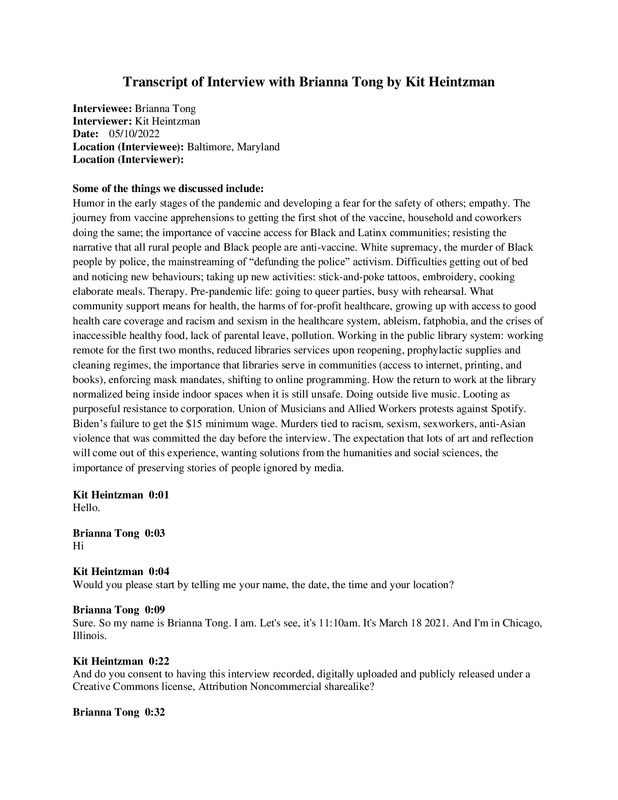 2021-03-18
2021-03-18Brianna Tong Oral History, 2021/03/18
Self description: “I am sitting in my bed right now as I’ve done for a lot of this quarantine. In regular times and I guess still now, I’m in three bands and I also work at the library, the public library. So I’ve been working there in person since we came back to work in May. I was contacted for this interview through Bussy Kween Power Trip, which is a Black queer punk band with three people, no guitars, so my close friends. I’m in two other bands. One band is called Je’raf and one is called Cordoba. And one person each from Bussy Kween is in each of those bands. Haven’t played a show in forever. I can give a little about what I look like or am like. I’m a woman. I’m 26, almost 27 I guess. I’m Black and Asian. I’m kinda short. And during this pandemic I’ve been in general super lucky to have a job still and a great living situation. And I met my partner right before the pandemic, so we’ve been chilling a lot and that’s been amazing. She is so great. Yeah, just going to work and working on all kinds of things in my home. And sometimes having the energy to do a bunch of music and crafts and other art things, and sometimes laying in bed for a full day.” -
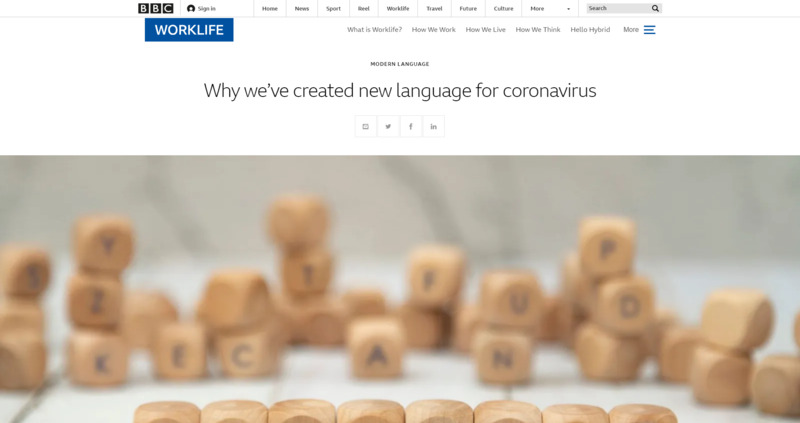 2020-05-24
2020-05-24Why We've Created New Language for Coronavirus
Language is ever evolving, and an event such as the COVID-19 pandemic has certainly led to new words and phrases in the English language and to new definitions for existing words and phrases. It remains to be seen which words that were coined during the pandemic will survive long-term and which ones will remain in a dictionary rather than in regular usage. This article, describing the English language from the British Broadcasting Corporation (BBC), describes changes in British, Indian, Canadian, and Australian English during these pandemic times. It discusses the speed of the linguistic change brought about by the pandemic and the coining of new words and phrases and new definitions of existing words and phrases. -
 2020-03-13
2020-03-13Coming out during a pandemic
I have submitted my experience of the pandemic from the months of February 2020 through August 2020. I talk about my experience of coming out immediately before the nation shut down. My submission is important to me because I give my personal experience of the pandemic as it pertains to being gay. I find that there isn't enough LGBTQ+ history documented, so I feel that I am contributing to a cause by telling part of my story. -
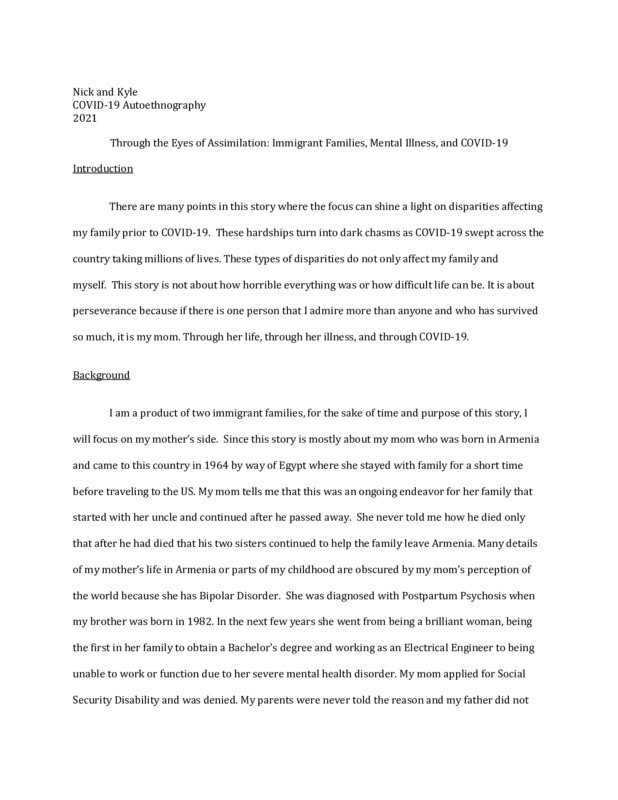 2020-05-09
2020-05-09Through the Eyes of Assimilation: Immigrant Families, Mental Illness, and COVID-19
This story is about my partner's family, utilizing both of our perspectives to talk about how his mother, and subsequently my partner, was treated due to mental illness, ethnicity, and gender identity. -
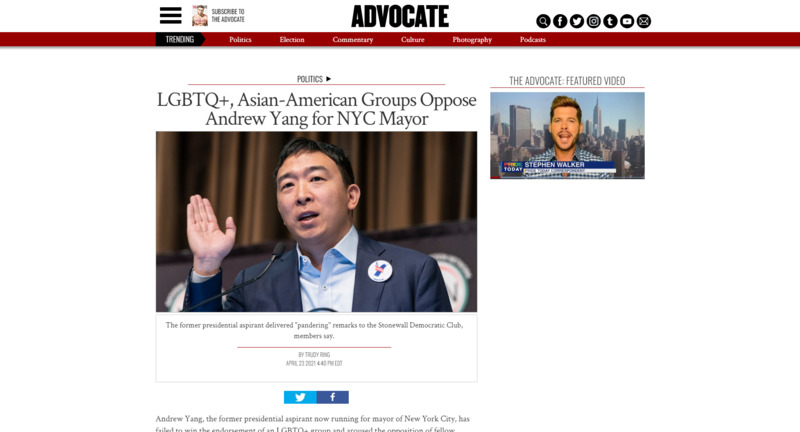 2021-04-23
2021-04-23Yang Not Getting LGBTQ Support for NYC Mayor
People in the LGBTQ community feel that the former Democratic Presential nominee is not out for their best interest but instead is just using them for their vote. They feel like he should push more for homelessness, housing, healthcare, and other issues important to the LGBTQ people but Mr. Yang says he loves and supports the community. He is running for New York City mayor and is the former nominee of the democratic party. -
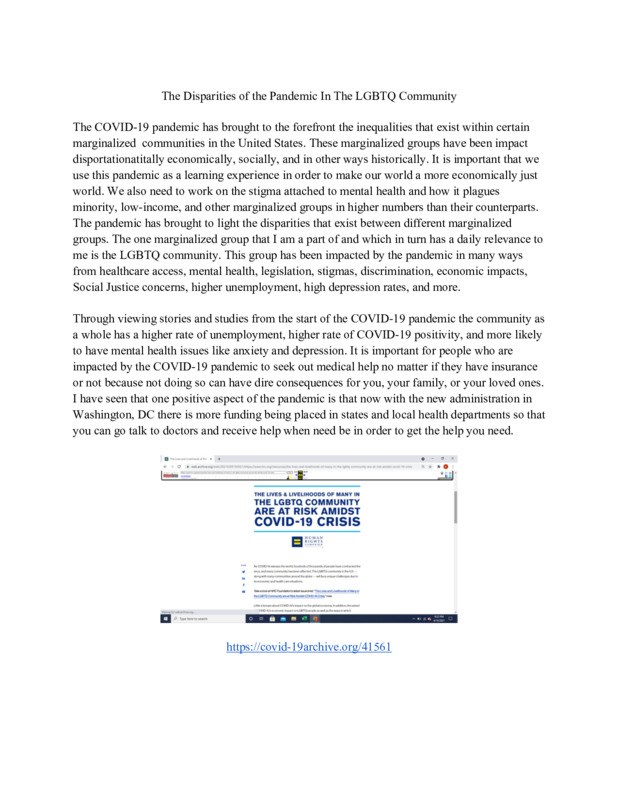 2021-04-25
2021-04-25Robert Baker-Nicholas Portfolio
The internship experience has been one that has taught me many new and different skills that I did not have before or were very low on my abilities prior to this experience. Before I started this internship I had no experience in the field of public history or curation. I gained skills like learning how to preserve various sources for future posterity. I learned the process of properly using a system like Omeka, securing digital sources for the future, working on collections, oral histories, and more. The oral history part of my internship gave me skills that I can bring into my current role as a Social Studies Curriculum Coordinator by having some of our teachers encourage our students to conduct oral histories of our local town members in order to meet their standards in our state. My school uses the hands-on teaching method in order to bring the curriculum alive and this could be one way to implement and bring history alive. I also sharpened my skills of teamwork, collaboration, and virtual zooming in order to meet a project end goal. One thing this experience has taught me is that the pandemic has caused technology and collaboration to be taken to a next level and that I feel it will continue to grow and change in the future. This experience will also be memorable due to the fact that the actual documentation of the history is occurring while the events are happening not after the fact which is a unique experience. -
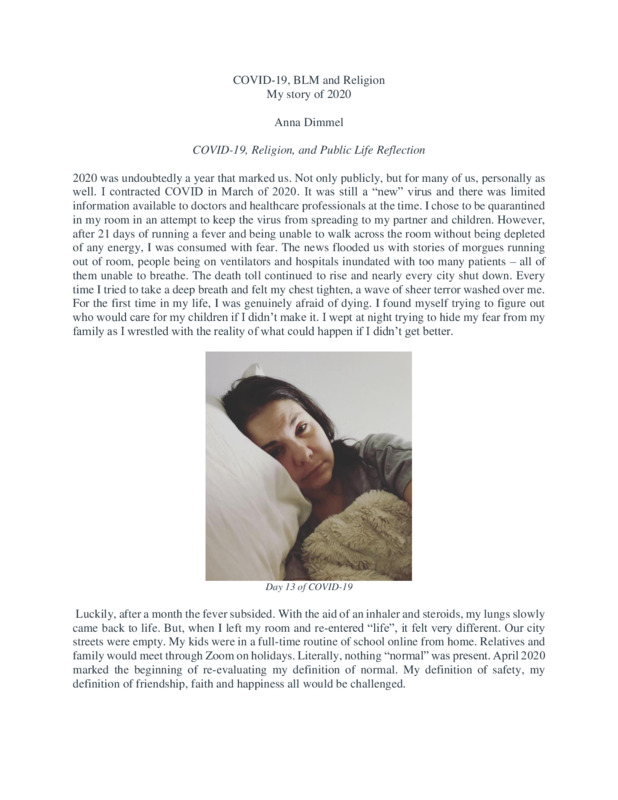 2021-04-23
2021-04-23COVID 19, BLM and Religion - My story of 2020
This story tells my experience of having Covid-19 along with being the mother of a brown child during the pandemic and BLM movement. I also share how this year drew the line in the sand for our family's faith and how my partner and I finally found the courage to come out. -
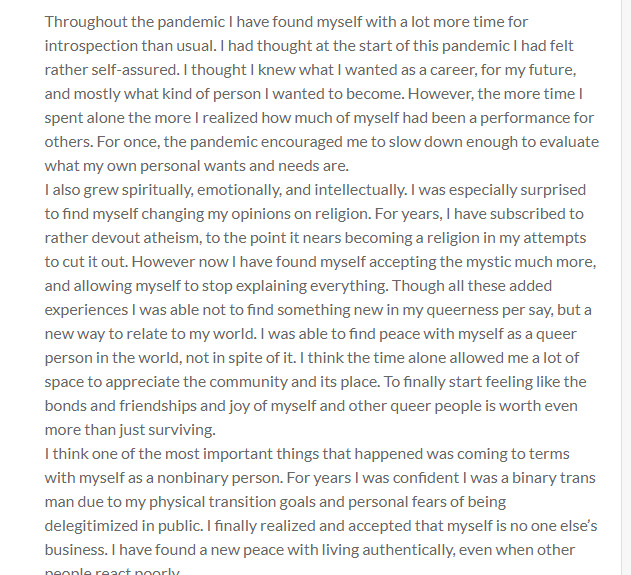 2021-04-22
2021-04-22Queer Joy
Throughout the pandemic I have found myself with a lot more time for introspection than usual. I had thought at the start of this pandemic I had felt rather self-assured. I thought I knew what I wanted as a career, for my future, and mostly what kind of person I wanted to become. However, the more time I spent alone the more I realized how much of myself had been a performance for others. For once, the pandemic encouraged me to slow down enough to evaluate what my own personal wants and needs are. I also grew spiritually, emotionally, and intellectually. I was especially surprised to find myself changing my opinions on religion. For years, I have subscribed to rather devout atheism, to the point it nears becoming a religion in my attempts to cut it out. However now I have found myself accepting the mystic much more, and allowing myself to stop explaining everything. Though all these added experiences I was able not to find something new in my queerness per say, but a new way to relate to my world. I was able to find peace with myself as a queer person in the world, not in spite of it. I think the time alone allowed me a lot of space to appreciate the community and its place. To finally start feeling like the bonds and friendships and joy of myself and other queer people is worth even more than just surviving. I think one of the most important things that happened was coming to terms with myself as a nonbinary person. For years I was confident I was a binary trans man due to my physical transition goals and personal fears of being delegitimized in public. I finally realized and accepted that myself is no one else’s business. I have found a new peace with living authentically, even when other people react poorly. Finally, I honestly love being queer. -
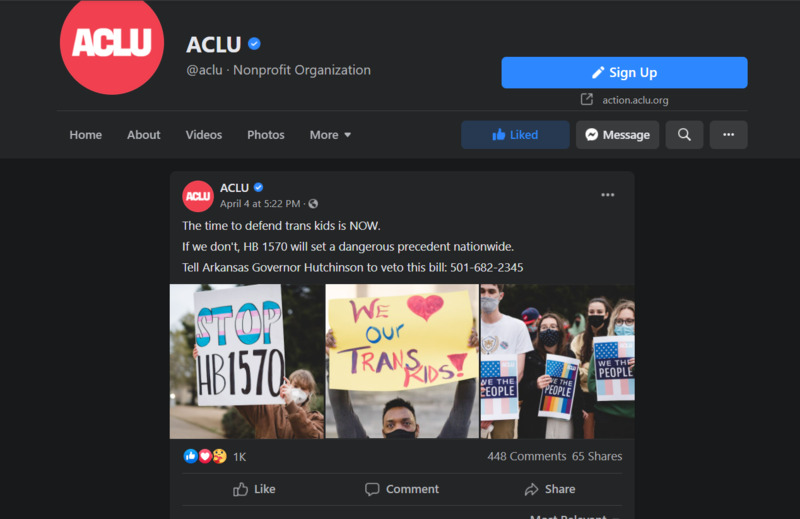 2021-04-04
2021-04-04ACLU The time to defend trans kids is NOW.
The time to defend trans kids is NOW. If we don't, HB 1570 will set a dangerous precedent nationwide. Tell Arkansas Governor Hutchinson to veto this bill: 501-682-2345
